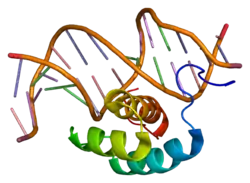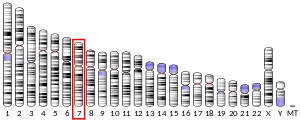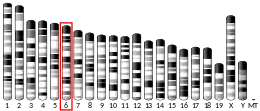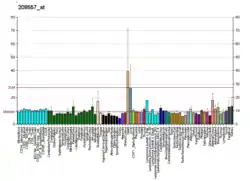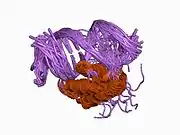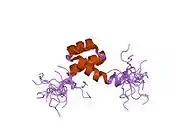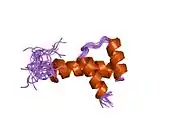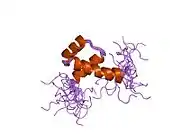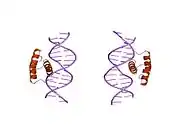Homeobox protein Hox-A6 is a protein that in humans is encoded by the HOXA6 gene.[5][6][7]
Function
In vertebrates, the genes encoding the class of transcription factors called homeobox genes are found in clusters named A, B, C, and D on four separate chromosomes. Expression of these proteins is spatially and temporally regulated during embryonic development. This gene is part of the A cluster on chromosome 7 and encodes a DNA-binding transcription factor which may regulate gene expression, morphogenesis, and differentiation.[7]
Clinical significance
Leukemia
HOXA6 was examined to be preferentially expressed in primitive cells (e.g. hematopoietic progenitor cells), under the regulation of growth factors and cell cycles. Interleukin 3 and all-trans retinoic acid were found to be the inducing factors that can stimulate the expression of HOXA6. In mitotic process, HOXA6 was mainly expressed in S-phase and G2M phase cells. Overexpression of HoxA6 increased proliferation but inhibited differentiation of multipotential stem cells in the process of hemopoiesis,[8] even had the capacity to transform primary hematopoietic cells into immortal cell lines. Transplantation of these cell lines may cause acute myeloid leukemia in recipient animals.[9] Also in patients with acute myeloid leukemia, HOXA6 expression was upregulated. The co-methylation of HOX genes, including HOXA6, leads to the dysfunction of tumor suppression genes by reducing gene expression. The methylation processes can be identified in adult chronic lymphocytic leukemia and childhood acute lymphocytic leukemia.[10]
Glioblastoma
HOXA6 may also contribute to the invasive tendency of glioblastoma multiforme cells. Suppressed expression of HOXA6 by introducing its antisense fragments can reduce the invasion of glioblastoma multiforme cells.[11]
References
- 1 2 3 GRCh38: Ensembl release 89: ENSG00000106006 - Ensembl, May 2017
- 1 2 3 GRCm38: Ensembl release 89: ENSMUSG00000043219 - Ensembl, May 2017
- ↑ "Human PubMed Reference:". National Center for Biotechnology Information, U.S. National Library of Medicine.
- ↑ "Mouse PubMed Reference:". National Center for Biotechnology Information, U.S. National Library of Medicine.
- ↑ McAlpine PJ, Shows TB (July 1990). "Nomenclature for human homeobox genes". Genomics. 7 (3): 460. doi:10.1016/0888-7543(90)90186-X. PMID 1973146.
- ↑ Scott MP (November 1992). "Vertebrate homeobox gene nomenclature". Cell. 71 (4): 551–3. doi:10.1016/0092-8674(92)90588-4. PMID 1358459. S2CID 13370372.
- 1 2 "Entrez Gene: HOXA6 homeobox A6".
- ↑ Dickson GJ, Kwasniewska A, Mills KI, Lappin TR, Thompson A (March 2009). "Hoxa6 potentiates short-term hemopoietic cell proliferation and extended self-renewal". Experimental Hematology. 37 (3): 322–33.e3. doi:10.1016/j.exphem.2008.10.015. PMID 19157684.
- ↑ Bach C, Buhl S, Mueller D, García-Cuéllar MP, Maethner E, Slany RK (April 2010). "Leukemogenic transformation by HOXA cluster genes". Blood. 115 (14): 2910–8. doi:10.1182/blood-2009-04-216606. PMID 20130239. S2CID 24616899.
- ↑ Kishida Y, Natsume A, Kondo Y, Takeuchi I, An B, Okamoto Y, Shinjo K, Saito K, Ando H, Ohka F, Sekido Y, Wakabayashi T (February 2012). "Epigenetic subclassification of meningiomas based on genome-wide DNA methylation analyses". Carcinogenesis. 33 (2): 436–41. doi:10.1093/carcin/bgr260. PMID 22102699.
- ↑ Guo YB, Shao YM, Chen J, Xu SB, Zhang XD, Wang MR, Liu HY (January 2016). "Effect of overexpression of HOX genes on its invasive tendency in cerebral glioma". Oncology Letters. 11 (1): 75–80. doi:10.3892/ol.2015.3893. PMC 4727036. PMID 26870170.
Further reading
- Boncinelli E, Acampora D, Pannese M, D'Esposito M, Somma R, Gaudino G, Stornaiuolo A, Cafiero M, Faiella A, Simeone A (1990). "Organization of human class I homeobox genes". Genome. 31 (2): 745–56. doi:10.1139/g89-133. PMID 2576652.
- Apiou F, Flagiello D, Cillo C, Malfoy B, Poupon MF, Dutrillaux B (1996). "Fine mapping of human HOX gene clusters". Cytogenetics and Cell Genetics. 73 (1–2): 114–5. doi:10.1159/000134320. PMID 8646877.
- Walters JR, Howard A, Rumble HE, Prathalingam SR, Shaw-Smith CJ, Legon S (August 1997). "Differences in expression of homeobox transcription factors in proximal and distal human small intestine". Gastroenterology. 113 (2): 472–7. doi:10.1053/gast.1997.v113.pm9247466. PMID 9247466.
- Kosaki K, Kosaki R, Suzuki T, Yoshihashi H, Takahashi T, Sasaki K, Tomita M, McGinnis W, Matsuo N (February 2002). "Complete mutation analysis panel of the 39 human HOX genes". Teratology. 65 (2): 50–62. doi:10.1002/tera.10009. PMID 11857506.
